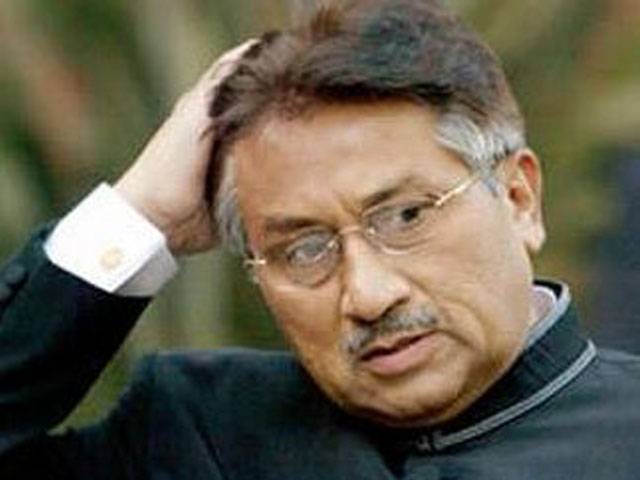ISLAMABAD - Former President and Army Chief General (r) Pervez Musharraf on Saturday again filed the review petition against the July 31, 2009 judgment, after removing the objections.
The registrar office on December 24 had returned the petition with the objection that there was no signature of Musharraf’s counsel Sharifuddin Pirzada on the petition and at three places in the petition, word ‘Justice’ was not written with ex-CJP Iftikhar Muhammad Chaudhry.
Former military dictator is facing trial for condemning the constitution under Article 6 which could lead to life sentence or even death penalty. The government case against him is primarily based on July 31 judgement of the apex court and therefore the ex-general president is seeking review of that verdict against him.
“The judgment was coram non judice, per incurium, void, unlawful and has been passed in violation of the principal of justice and thus legally not sustainable and also there are floating mistake and errors apparent on the face of the judgment and as such it is liable to be reviewed,” the petition said.
Musharraf filed the Civil Review Petition under Article 188 of the constitution read with Order XXVI Rule 1 of Supreme Court Rules, 1980. The review petition is being filed after about 4 years and 5 months, therefore application for condonation of delay is separately filed relying on the law laid down in Nawaz Sharif vs State (PLD 2009 SC 814) and the Federation vs Nawaz Sharif PLD 2009 SC 531.
The review petition described the events from the appointment of Justice (r) Iftikhar Chaudhry as Chief Justice of Pakistan and Proclamation of Emergency and the restoration of the judges of the higher judiciary. It was stated that due to bias against him (Musharraf) the July 31, 2009 judgment was passed, but no direction was given in the binding and operative part of the judgment for prosecution under high treason against Pervez Musharraf.
It was argued in the petition that Musharraf was an elected president and being the President of Pakistan he administered the oath to Prime Minister Yousaf Raza Gilani and the cabinet members. It was stated that in the judgment his election and that of his successor and taking oath by him was declared lawful.
Pervez Musharraf prayed that July 31 judgment and the findings given in it would prejudice his case before a three-judge Special Court, constituted by the federal government for his trial under Article 6 of the constitution, as the prosecution would rely on this judgment.
“The July judgment was against the principle of the natural justice as the Musharraf was condemned unheard and Mr Iftikhar Muhammad Chaudhry, ex-CJP became judge of his own cause.” It was stated that in both the petitions – Nadeem Ahmed vs Federation and the Sindh High Court Bar Association, filed after the reinstatement of the Justice (r) Iftikhar and other judges, former dictator was not made party.
Musharraf contended that when the attorney general and the federation did not defend him therefore the apex court issued notice to him to his residential address for appearance on July 27, 2009, whereas it was in the knowledge of everyone that he was not in Pakistan at that time.
Later, the process serving officer was deputed to deliver the copy of the notice at Musharraf residential address at C-1-B, Park Road, Chak Shahzad, Islamabad. The said process officer reported back that he went to that address and person present there namely Muhammad Hussain son of Amer refused to receive the notice. After that no substitute service was made and the hearing continued without adding or impleading Musharraf as party to the proceedings of formally passing an order for ex-parte proceeding.
Musharraf lawyers contended that though the Supreme Court declared November 3, 2007 act of Musharraf un-constitutional yet in the operative part of the order did not mention that he should be prosecuted under high treason because holding in abeyance of constitution was not considered an offence of high treason even in the case of General Ziaul Haq and Musharraf act of October 12, 1999. The petition stated that the word of ‘hold in abeyance’ was included in the Article 6 of the constitution through 18th Amendment, made in the constitution much later, therefore July 2009 judgment was silent about the prosecution of Musharraf under high treason.
Friday, April 19, 2024
Mush resubmits plea for July 31 verdict review

Opposition objects to oath-taking of MNAs amid lawlessness
5:15 PM | April 19, 2024
Electioneering to end on Friday night ahead of by-polls in 21 constituencies
5:14 PM | April 19, 2024
Fawad Chaudhry granted bail in 14 cases related to May 9 violence
5:13 PM | April 19, 2024
British Army chief lauds Pakistan Army's professionalism, expertise
5:12 PM | April 19, 2024
Israeli aircraft fire missiles at Air Force assets in Iran: Report
3:52 PM | April 19, 2024
A Tense Neighbourhood
April 19, 2024
Dubai Underwater
April 19, 2024
X Debate Continues
April 19, 2024
Hepatitis Challenge
April 18, 2024
IMF Predictions
April 18, 2024
Kite tragedy
April 19, 2024
Discipline dilemma
April 19, 2024
Urgent plea
April 19, 2024
Justice denied
April 18, 2024
AI dilemmas unveiled
April 18, 2024
ePaper - Nawaiwaqt
Advertisement
Nawaiwaqt Group | Copyright © 2024





